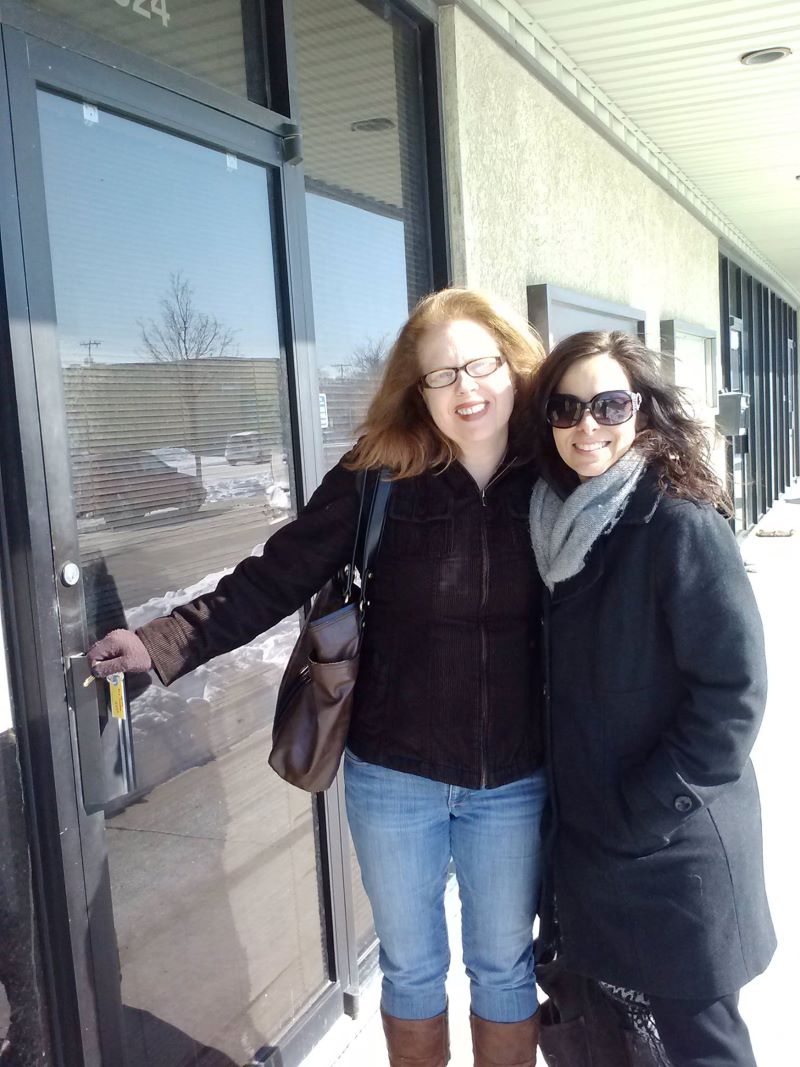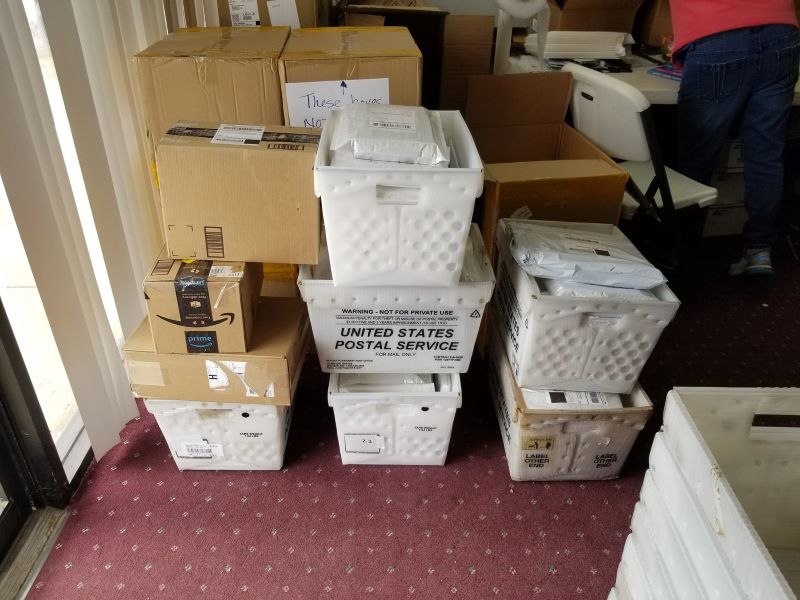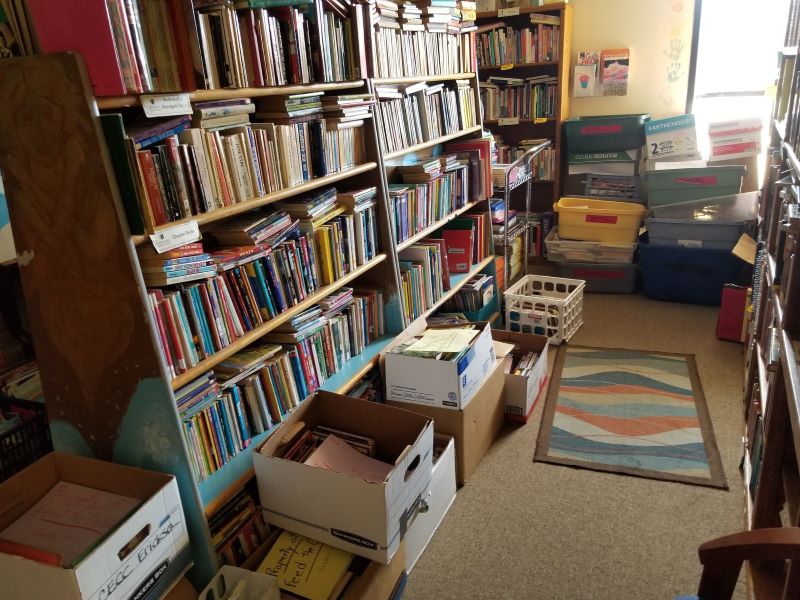A year ago the high speed train of our lives came to a screeching halt. Plans were canceled, students went on spring break and never went back to school, and most businesses had to close their doors, not knowing when they would open again.
Orphans Treasure Box, a small nonprofit bookstore in North Champaign was one of those businesses. Founder and owner Beth Wendling closed the outlet to the public on March 14th, and slowly reduced staff and volunteers until just her family was left. Governor Pritzker’s executive order went into effect a week later.
Wendling became emotional describing her thoughts as her husband and son drove the last batch of online orders to the post office. “I remember thinking ‘this is how it ends’. When people die, they talk about their life flashing before them. The life of this business flashed before me. I thought of all the people — all of the Restart women, the staff, the volunteers — it was painful.”

Wendling (left) in 2014 with former staff member Barbra King. Photo from Orphans Treasure Box website.
Orphans Treasure Box began in Wendling’s house in 2011, and moved into the current location on Pioneer Street in Champaign in 2014. I worked there from 2014 to 2019, so I’ve experienced first hand the good that happens there. The concept is pretty straightforward. People in the community donate books, many are sold online through Amazon and other book selling sites (OTB now has a selling site of their own), and before the pandemic, the excess inventory was sold at garage sale prices in the outlet store. Proceeds from book sales are donated to organizations serving orphaned children abroad, and kids in need locally.
In recent years, OTB added another mission: helping single mothers facing poverty and homelessness re-enter the workforce through temporary, part-time work. ReStart began in 2016, and since then more than 20 women have participated in the program, many going on to secure housing and full time employment. So, closing the doors meant uncertainty for the women employed through ReStart, and the fate of a nine year old business that was more than just a bookstore.
Wendling, whose faith is a guiding force in her life and in the life of Orphans Treasure Box, says that God gave her a “peace in her heart” as she drove away from the store that day in March.
There are a lot of loose ends to tie up when you shut down your business operations. She had to turn off online selling accounts and go to the bank to shut down automatic payments. “Paying (ReStart employees) was priority one. I knew I had to preserve that.”
Part of the process included keeping track of the health and wellbeing of volunteers and staff. “I did almost a schedule in reverse. I wanted to know when was the last time all of these people were in…in case something happened…I wanted to have all of that information ready for the health department.” Two weeks after the last volunteer left, Wendling knew everyone was safe for the time being. “I just broke down. I felt like I had accomplished something big…it was just such a relief that no one was injured here.”
OTB was only shut down for eight days. Wendling learned they could be considered “essential” because they provided a social service through ReStart, and they were a supplier of educational materials. She went to the three women who were employed through ReStart at the time, to see if they wanted to come back.
Wendling expressed her anger for the rhetoric that has surrounded policy debates over offering relief during the pandemic, and the notion that people don’t want to work…that they would rather just sit at home and collect their checks. “I want to speak in their defense and just say bullshit.”
One employee in particular had been nearly full time when the shutdown happened. Wendling wanted to be ethical, and give her the opportunity to collect unemployment if she thought it would put her in a better place financially. She emphatically asked to remain on payroll. As someone coming out of addiction, spending her days at home bored and scared was not an option.

Photo from Orphans Treasure Box Facebook page.
All three employees came back, and it was a good thing they did. Shortly after Wendling fired up their online selling sites, orders came flooding in. Turns out, being an online bookseller during a time when the entire country was mostly at home, and when many were supporting their kids who were learning remotely, is fairly lucrative. In April of 2020, they sold more than 5000 items, well more than any other month in the history of Orphans Treasure Box. Things have evened out a bit now, averaging somewhere between 400 and 600 books sold per week. Wendling, her small crew of ReStart staff, and a few dedicated volunteers have kept it all flowing, with her middle school son doing remote learning in the office.
Wendling did not apply for the initial round of PPP loans; since she was still able to operate as an online business she didn’t feel it was necessary. She mentioned the decision to a customer, who dismissively told her “well, it’s not for somebody like you. It’s for real businesses. You shouldn’t be clogging the system.” It’s not the first time Wendling has not been taken seriously as a woman business owner. “It’s a sentiment I’ve felt, and I’ve wondered if people of color have felt when they own a small business.” She is applying now, so that she can continue to invest in the women who work there.
While the online store has always been the main economic driver of the business, the brick and mortar outlet was what many in the community knew and loved. As more retail businesses were allowed to open their doors, the phone calls from customers began immediately, wondering when the outlet would be once again opening to the public. “I think everybody understood March, April, and May. But then it was like ‘why aren’t you open.’ People don’t always understand how the parts of a business fit together. We were overwhelmed with donations…everyone was sitting at home decluttering. We had to fill up retail space as storage.” She’s had some unsolicited opinions about that decision as well, including someone telling her she needed to “get her act together” and open the outlet.

The former children’s room, now filled with books ready to be given away. Photo from Orphans Treasure Box website.
Wendling is undeterred by such comments, and for the most part people have been supportive of her decisions, and the work that Orphans Treasure Box does. After nine years, she knows this place and what it can do, and is constantly looking ahead to what it could become. She recently announced that the outlet will not return, at least not in the way it existed before. “We’ve kind of moved on. I’m sorry that it’s painful for people that really loved it, but my highest value is not making everybody happy.” The space has been devoted to online inventory, and books that would normally be sold in the outlet are being given away: to school districts, food pantries, prison libraries, to an organization that serves migrant families…the list continues to grow.
While local customers no longer have the option to shop for books that are a quarter or 50 cents, they can order from the online store and do curbside pickup, and there are ongoing special offers. You can still get a great deal on used books, and know that you are helping the community every time you purchase.
Though the doors are closed to the public, the bookstore keeps chugging along with now mostly vaccinated volunteers, a new ReStart hire, and a continued committment to being a positive light in the community and beyond.








